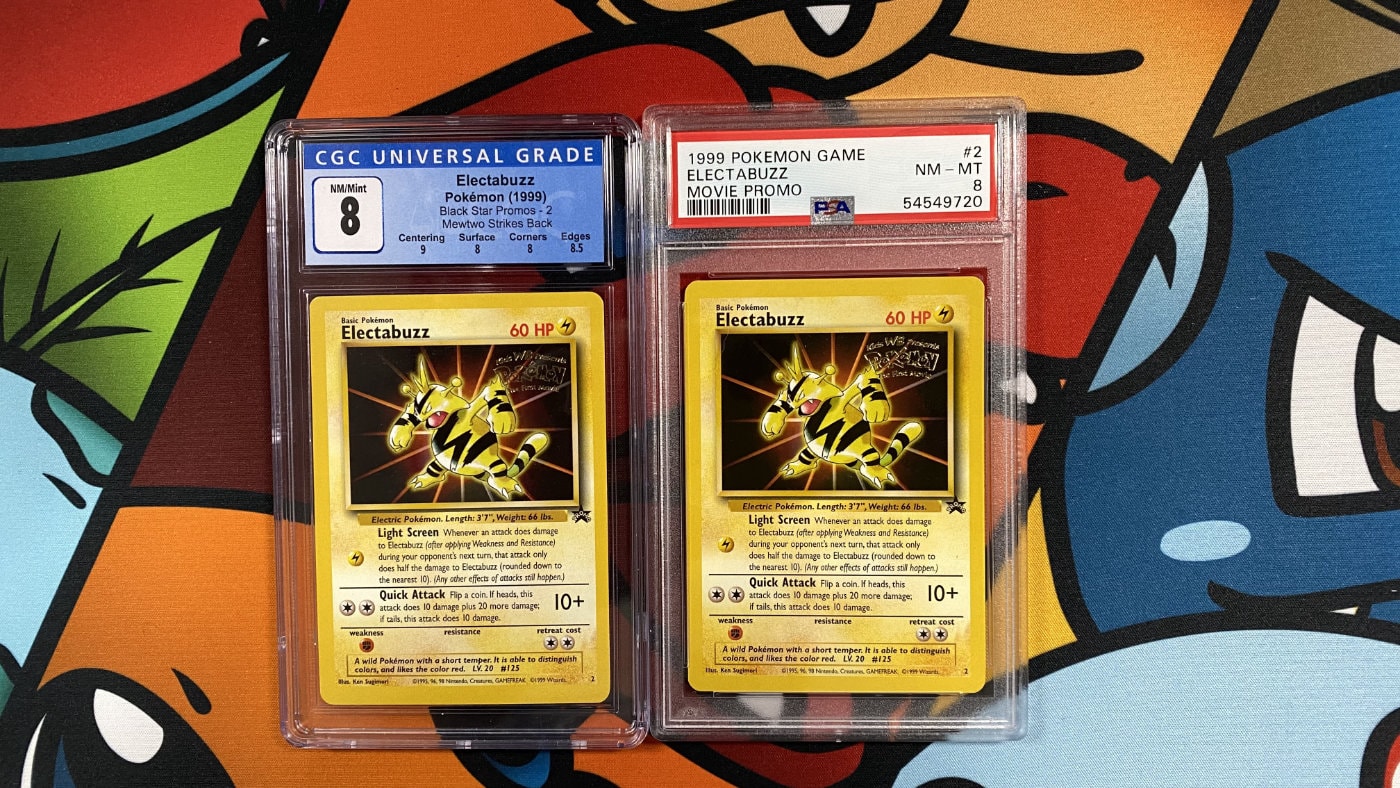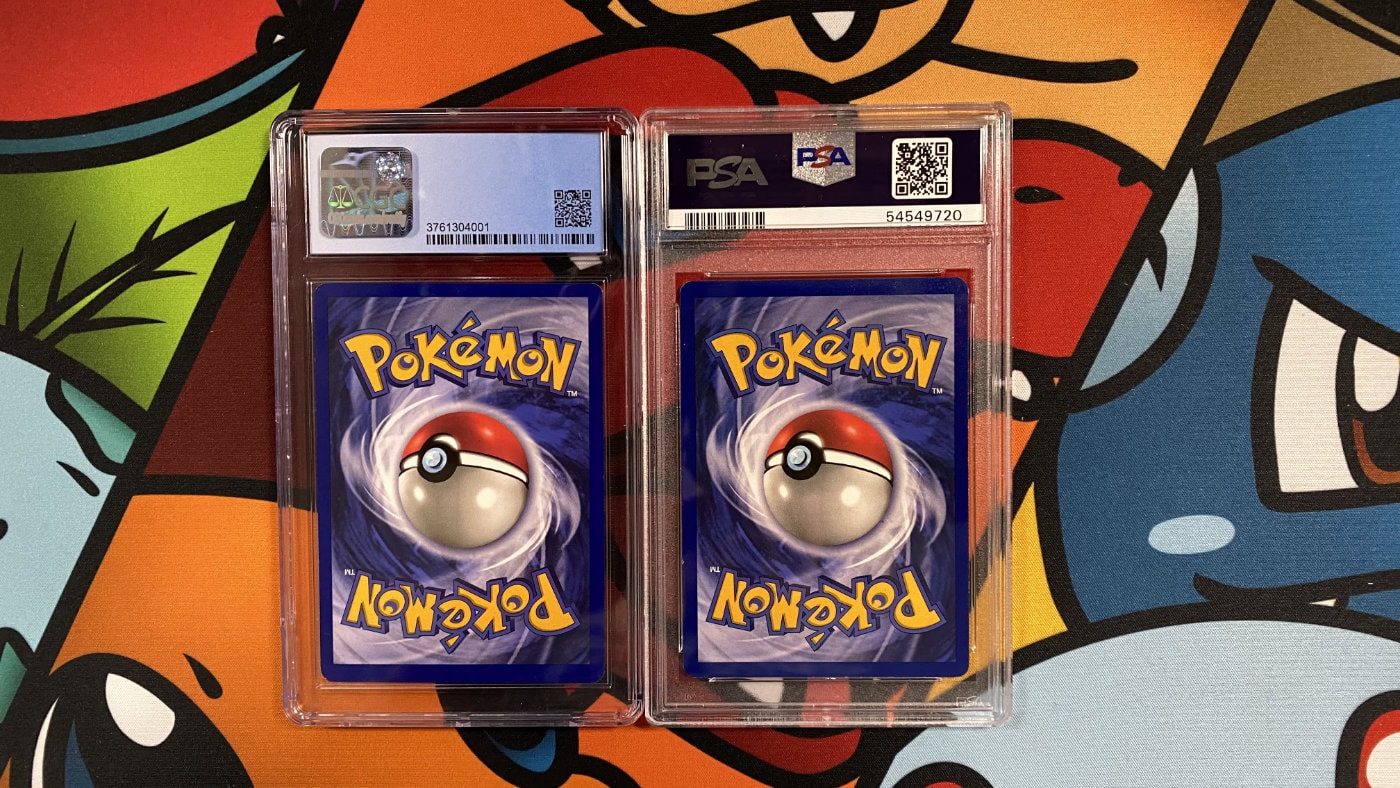Pokémon cards continue to be hot, but graded Pokémon cards are even hotter! There is something super awesome about being able to tell someone you have a professionally authenticated and graded Pokémon card that is preserved in a high quality case forever. However, are all grading companies equal? I mean there are quite a few companies that offer grading services, but which is the best?
I've only ever had my cards graded with the Certified Guaranty Company (CGC) and Professional Sports Authenticator (PSA), but I do have some opinions from personal experience.
In this article, I'm going to share my experience and opinions while trying to back it up with pictures and data.
I have to reiterate that everything I share is a personal opinion more than anything. My one goal is to give you something to think about when you go get your cards graded.
The Feel, Shape, Size, and Overall Quality of the Graded PSA and CGC Slabs
I'm going to do my best here to describe things, but you might not believe me unless you experience the PSA and CGC slabs for yourself.
The most obvious thing you'll notice is that the CGC slabs are clear while the PSA slabs are frosted.

I think both slabs look good.
When you stack CGC slabs and PSA slabs together, the width and height are nearly identical to the eye. This is probably not the case with super technical tools, but just by looking and feeling, they seem to be the same size. The depth is not the same size though, not that it is a super big deal.

The PSA slabs are thinner. They don't look noticeably thinner, but they feel thinner. In case you couldn't determine in the above image, the slab on the left was PSA and the slab on the right was CGC. Like I said, the thinness isn't a huge deal, but it is something noticeable to the touch.
What I found to make PSA slabs superior is the overall shape of the slab and the material.
First, when you hold them, the PSA slabs feel more lightweight in comparison to CGC slabs, but also more durable at the same time. How that makes sense I will never know, but it's a sensory thing.
When I talk about the shape, I'm talking about the ridges specifically. Both the PSA and CGC graded slabs have ridges, but the PSA ridges are more defined. PSA slabs seem to stack and lock like Lego bricks. They don't really wiggle or move around when they are stacked. The CGC slabs have ridges and they stack, but they don't stay together securely. I've received some broken CGC slabs because they moved around while shipping.
I find the quality, shape, and feel of the graded PSA slabs to be superior to the CGC alternative. A lot of this won't stick with you unless you experience the two for yourself.
The Grading Comparison Between Pokémon Cards
I happen to have two (2) cards that graded the same between CGC and PSA. In particular, I have an Electabuzz from the first Pokémon movie back in 1999 that graded an 8.0 at both companies.

To me, both cards look to be in great condition. I personally can't tell the difference between the two cards and cards that received a 10.0 grade. While I'll never know why the PSA card graded like it did, at least CGC gives me a little more insight with the subgrades.

The subgrades tell me information about the centering, corners, edges, and surface. Do I necessarily agree with the subgrades scores? Sometimes, but that is me just eyeballing the cards. I'm sure both companies use some precision tools when coming up with a score.
Rumor has it that CGC grades more difficult than PSA and I agree with that. I've had more than one hundred (100) cards come back from CGC and I haven't gotten a single 10.0. I've had far fewer cards come back from PSA, many with 10.0 grades.
I don't know if the strictness of CGC will have an impact on perceived quality in the future. The grades from CGC don't seem to impact resale on eBay, but this could change in the future.
Pricing, Process, and Turnaround Times of CGC and PSA
Like I said, authenticated and graded collectibles are hotter than ever right now. With this in mind, authenticators like PSA and CGC are being flooded with shipments. This is resulting in demand that these companies are not able to accommodate which is causing delays and higher prices due to staff increases.
First let me tell you about my own personal experiences with CGC and PSA.
My PSA Experience with Pokémon Cards
In November 2020 I sent my first batch of cards to PSA. I did a value shipment which required twenty (20) cards or more at $10.00 per card. This first batch was received by PSA in November 2020, the same month that I shipped them. However, each card was not entered into the PSA system until February 2021. This means that my cards sat in the box for several months before PSA had a look.
Fast forward to 2022, I got my first shipment back.
The twenty (20) cards I sent, which cost me $200.00 plus a little extra for shipping, took more than a year to be returned to me. Not a great feeling, but at least they came back.
To get an idea of current turnaround times at PSA, you can have a look at the complete-through dates listed on their website.

So what do these dates mean?
I'm no expert, but I have a decent understanding of what they mean. The complete-through date is the oldest order that they currently have in their system for any given tier.
Let's jump back to my example for a moment.
My shipment was entered into the PSA system in February 2021. That is the date we are comparing for the complete-through date. So if PSA had completed up until January X, 2021, I'd be able to make rough assumptions as to how far I am from being graded. I just want to reiterate that the complete-through date is not when the shipment was received, it is when they were entered.
My CGC Experience with Pokémon Cards
The CGC experience I had was slightly better in terms of turnaround times because they were the new kid on the block and not as trusted in the space. In other words, I assume they were receiving less cards than PSA.
If you're interested in learning how to submit to CGC, check out a tutorial I put out titled, How to Submit Pokémon Cards to CGC for Grading.
So in December 2020 I sent a bulk shipment to CGC which contained fifty (50) cards at $11.50 per card. I paid for subgrades and had a membership which got me a slight discount. It took around two (2) weeks for the cards to go from received to being entered into their system.
Fast forward a few months (like three or four) in 2021 and I got my cards back.
The fifty (50) cards I sent which cost $575.00 plus some extra for shipping, took a few months to come back. This was much faster than PSA at the time.
Let's break down the return times that CGC advertises for their service.

CGC does something similar to PSA, but not exactly the same. Instead, CGC lists the packages they are opening to enter into their system. This helps the people who are sitting in limbo after their package was delivered. CGC also gives an estimated amount of working days before the return is shipped back to you. This estimate is after the cards were entered into their system which could be a few months after they were received if you are unlucky.
To sum things up, both services have similar pricing for the lower tier shipments as well as similar return times.
If you're going for fastest returns, while CGC might be a little faster, I don't think it's enough to justify over PSA which leads as the central authority.
Conclusion
I had a few returns from the Certified Guaranty Company (CGC) and a few returns from the Professional Sports Authenticator (PSA), but I found the graded card slabs from PSA to be superior. Neither service has prices, processes, or timings that I'm particularly thrilled about, so basing strictly on the slabs, PSA wins in my opinion.
Does this mean I'll only grade with PSA? No, but I'll likely use them as my primary for the time being. I have no doubt the slabs will change over time and will be worth checking out in the future.
Want a more visual comparison of the two slabs and grading companies? Check out a video I recorded and published to YouTube with a lot more camera angles to help you get an idea of what the slabs look like.